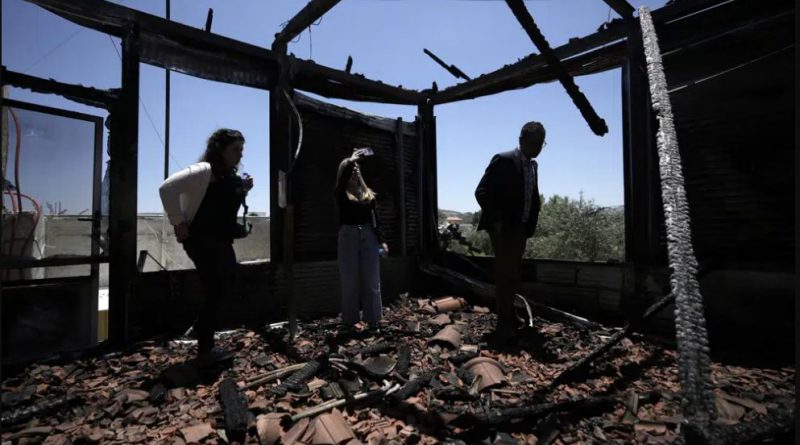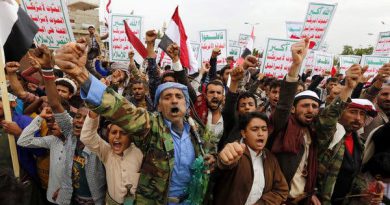Israel arrests 3 settlers suspected in violent attacks in Palestinian towns
Jerusalem (AP) — Israel’s security agency said Friday it had detained three Israeli settlers on suspicion of involvement in mass rampages through Palestinian towns in the occupied West Bank this week following the killing of four Israelis.
While rights groups welcomed the arrests, the small number of suspects — given the scale of the attacks — revived criticism of the wider lack of accountability for Israeli settlers.
“The rule is impunity from justice,” said Roy Yellin, of the Israeli rights group B’Tselem.
Israel’s Shin Bet security agency did not identify the three detained Israelis.
Israeli military spokesman Rear Adm. Daniel Hagari told reporters he hoped “that there will be enforcement, that there will be law.” He said he expected police to make more arrests.
Over the past three days, Jewish settlers have torched and vandalized dozens of Palestinian homes and cars throughout the West Bank in retaliation for Wednesday’s Palestinian shooting attack that killed four Israelis. Their ferocity echoed a deadly settler rampage in February in the northern Palestinian town of Hawara. Some Israeli settlers were detained following that attack, but swiftly released without indictments.
The Israeli rights group Yesh Din on Friday described the arrests as “a drop in the ocean.” The group has documented the burning of at least 30 Palestinian homes, 60 cars, a gas station, multiple shops, a mosque and school throughout northern West Bank villages this week. The number of homes and cars burned or vandalized, it acknowledged, is probably higher.
The group’s director, Ziv Stahl, alleged that the Israeli military’s inability or unwillingness to prevent settler attacks was “part of an intentional policy rather than a mistake.”
“(The army) had four mounts after (the attack in) Hawara to study how to deal with this and stop it,” she said. “But everything happened in broad daylight. They didn’t detain anyone on the scene. They allowed the settlers to do whatever they felt like doing.”
The Israeli military acknowledged that it had failed to prevent the waves of Israeli settler reprisals against “innocent Palestinians.” Hagari called Wednesday’s rampage through the typically sleepy and well-to-do Palestinian town of Turmus Ayya north of Ramallah a “horrible event.” He said the military was beefing up forces in the area.
“It’s a severe event that we should prevent, and we failed to prevent it,” Hagari told reporters, adding that security forces had expected extremist vigilantes to descend on Palestinian towns after the funerals of the killed Israelis. “We did not succeed because the force wasn’t large enough to prevent it.”
The surging violence in the West Bank has created a test for Israel’s far-right government, which has vowed take a hard line against the Palestinians and expand Jewish settlements in the territory, which Israel captured in the 1967 Mideast war.
On Friday, National Security Minister Itamar Ben-Gvir visited Eviatar, an unauthorized settlement outpost in the northern West Bank that was evacuated by the previous Israeli government in 2021. Addressing a crowd of young ideological Jewish settlers, he pressed for a more aggressive military response to Palestinian attacks.
He exhorted the settlers to “run to the hilltops,” referring to Israel’s unauthorized outposts on West Bank hilltops. He demanded the government “take down buildings and eliminate terrorists.”
“Not just one or two,” he said. “But dozens and hundreds, and if needed, thousands.”
Wednesday’s violence particularly traumatized residents of Turmus Ayya and Urif, the hometown of the two assailants who carried out Wednesday’s shooting, leaving residents fearful for their safety. Confrontations erupted between Israeli security forces and Palestinian residents who hurled stones and fireworks, killing a 27-year-old Palestinian and wounding at least a dozen others.
Security footage of the attacks that circulated on social media Friday drew further outrage. Closed-circuit television footage from Urif on Wednesday authenticated by Yesh Din showed a masked man with a dog on a leash violently ripping out all the pages of a Quran, and flinging the pages into the street.
Mustafa Shehadeh, head of the medical team in Urif, said the man broke broke the door of the village mosque, let his dog loose in the prayer room and grabbed at least 10 Qurans. “He ripped them up in front of me and threw all of them into the trash,” he said. Settlers also hurled stones at homes with children inside, he said, wounding at least 40 people, many of them in the head.
“The attacks were painful in a way I will not forget,” he said.
Other videos from Turmus Ayya show a group of young vandals shooting, apparently at random, in the direction of Palestinian homes.
Vigilante violence against Palestinian towns continued late Thursday, with residents reporting settlers throwing stones at Palestinians in villages north of Ramallah and south of the city of Hebron, wounding at least six people.
The attacks have also put increased pressure on the Palestinian Authority, which exerts limited autonomy in parts of the West Bank. During Palestinian Prime Minister Mohammed Shtayyeh’s visit to the ruined homes and charred cars of Turmus Ayya, residents demanded that the authority do more to protect its people, either by deploying security forces or giving them weapons.
A member of the Palestine Liberation Organization’s executive committee, Bassam al-Salhi, appealed on Friday for the creation of an armed Palestinian national guard to fend off settlers in Palestinian towns vulnerable to settler attacks.
Palestinian officials dismissed the idea but said authorities were considering the formation of village watch teams and other civilian committees to alert Palestinian residents to settler rampages and mobilize self-defense.
“This is really something necessary,” said Ahmad Majdalani, the minister of social development. “The Palestinian people are defenseless and must protest peacefully against this aggression.”
Hagari, the Israeli military spokesperson, urged restraint. When asked what his message would be to Palestinians under Israeli security control who are worried about future settler attacks, he said that Israeli security forces are “doing the best effort that we can.”
“We are in charge of this area,” he said. “It’s part of our job.”



